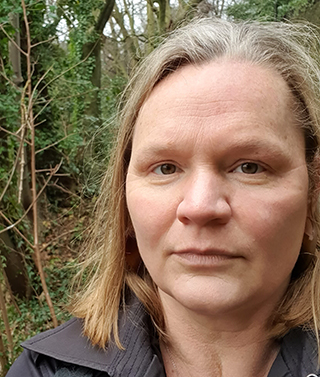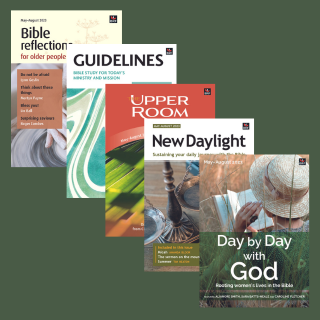In the first of a new series of articles on lifelong learning, writer, linguist and academic Valerie Hobbs challenges some common ideas about what the phrase might mean.
23 April 2023
Our sister wisdom: reflections on lifelong learning
Say to wisdom, ‘You are my sister,’ and call understanding your intimate friend.
Proverbs 7:4 (NASB)
I was invited by BRF to write a short article on lifelong learning. Yet I’m going to go out on a limb here to say that, although a quick Google search will offer you many, many reflections by Christians on this topic, the Bible doesn’t have much to say on the subject. Speaking as an academic whose career is quite literally devoted to lifelong learning, I’ll try to explain what I mean.
One of the greatest enemies of our era is the constant pressure to marketise every minute of our lives. As a child, I was indoctrinated with a supposedly Christianised (read: Puritan) version of this tenet of capitalist religion, not least by being taught to think of all my activity in terms of kingdom usefulness.
‘It’s my decided view that the Bible doesn’t have much to say on the subject of lifelong learning.’
In practice, this seemed principally defined as the amassing of influence, particularly political and economic. By my own industry and integrity, it was implied, if not stated outright, I would honour God’s name and thus expand his kingdom, earning his favour.
The Bible’s books of wisdom (especially Proverbs) were often cited as guides for this best behaviour, in a fragmented, moralistic fashion. But there were other passages that frequently came up, from Colossians 2 and 1 Peter 4, for example.
And, in a sense, it worked certain wonders for many of us. In school, a committed set of us were duly diligent, reading a wide range of humanity’s published excellence, memorising definitions, theories, pieces of music and stories, reproducing and otherwise performing them for exacting audiences. We acquired an impressive range of skills, always learning, always doing. In this, we launched ourselves obediently into the world as lifelong learners.
A poignant side effect
Yet, of course, one particularly poignant side effect of such teaching was the attachment of an immense weight of guilt to any activity deemed mostly worthless. All our learning, for example, was strictly separated from the concept of leisure and rated for its value in service of our ‘godly’ mandate.
Just last night I saw one of many articles in a similarly legalistic vein, warning against ‘mere mindless entertainment’ and commending a posture of measuring each endeavour in terms of its ‘intentionality for learning’. ‘Every square inch for Christ!’ and ‘All work is God’s work!’ are the dominionist mantras I’ve grown accustomed to hearing. ‘The future depends on you!’
‘One side effect of such teaching was the attachment of an immense weight of guilt to any activity deemed mostly worthless.’
The sensitivity I’ve developed over the years to this particular ideology of learning was recently tested by an email I received from my Christian undergraduate alma mater, asking me to nominate fellow graduates excelling in exercising dominion in their ‘spheres of influence’ for an award. The examples that followed (including leading, starting, teaching, treating, working, engineering) struck me for the extent to which they were nearly all quantifiable against a version of that horrific term I’ve grown accustomed to in academia: impact.
In other words, the learning that matters is the learning that changes the world in some big way. And again, in the spiritualised version of this, the stakes couldn’t be higher. One particularly influential Christian leader recently put it like this: ‘All eternity hangs on true learners.’
Wowza! Talk about pressure.
On the contrary…
Yet it’s my insistent belief that our salvation offers us freedom from all such worries. The wisdom that the Bible concerns itself with in Proverbs and elsewhere in the canon of scripture is not a set of dos, don’ts and other demands, but rather a person: Jesus Christ, there when God established the heavens (Proverbs 8:22–30), he our imperishable inheritance, whose very mind is now ours by the power of the Spirit (1 Corinthians 1:30; 2:16). Today and every day after.
We who reign with Christ in the heavenly places have likewise been given new eyes (Matthew 13:16–17) to observe what God is saying about himself and his mighty acts of love through the scriptures and all of creation, but most powerfully through the person and work of our Saviour.
‘The wisdom that the Bible concerns itself with is not a set of dos, don’ts and other demands, but rather a person: Jesus Christ.’
And what is our response? The psalmist tells us, joy!
You make known to me the path of life;
Psalm 16:11 (NIV)
you will fill me with joy in your presence,
with eternal pleasures at your right hand.
And from such an abundance of joy springs also love for God and for one another, since God first loved us and rejoiced over us.
Viewed through such a liberating lens, lifelong learning is no longer yet another legalistic demand, dictated by the whims of humanity, which weighs disproportionately on those already crushed by all the prejudices of this life under the sun (Ecclesiastes 4).
Nor is it a privilege reserved for the powerful, who amass and hoard the time, money, space and aptitude for the constant acquisition of new knowledge and skills.
No. For the believer, what else is lifelong learning, then, but an embrace of Jesus Christ and of the world that he has made, full of his possessions? Our salvation launches us into a life of vulnerability, humility and curiosity, born out of richness of relationship with our Sister Wisdom, the Word Made Flesh, who declares no discovery too small to evoke wonder and praise (Psalm 104:24).
‘Viewed through such a liberating lens, lifelong learning is no longer yet another legalistic demand.’
As the American poet Linda Pastan wrote, nearly 100 years ago:
‘You tell me to live each day as if it were my last… By why the last? I ask. Why not live each day as if it were the first – all raw astonishment.’

Valerie Hobbs is senior lecturer in applied linguistics at the University of Sheffield, where she researches and writes on religious language. Her next book, No Love in War: A story of Christian nationalism, will be published in May by Mayfly Books. She also writes for our Guidelines Bible study notes.

Each day the first…
One way to come to each day afresh, as Valerie Hobbs recommends, is through daily Bible reading notes. We have five different sets of notes to choose from and each one offers the possibility of a fresh encounter with God. There’s a new issue of each title for May–August.
Stay in the loop
Be sure to keep up with all the latest news from BRF and our ministries by signing up for our weekly email.
